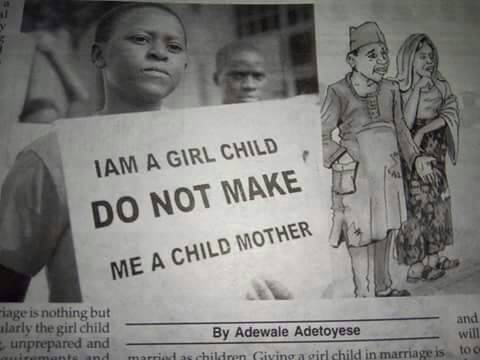
Child marriage is a formal or informal union entered into by an individual before reaching the age of 18. The United Nations (UN) also explains that child marriage is that type of marriage that happens when minors (people under the age of 16) are married off, especially when a young girl is made a bride even as a minor to a matured man which is the commonest of all globally. Also according to the Nigeria Child’s Right Act 2003, Sections 21 and 22, the age of consent in Nigeria is 18 years and anything against that is nothing but child marriage.
Looking at the above meaning given to child and marriage, it is clear that child marriage is nothing but the conscription of minors particularly the girl child into marriage when she is young, unprepared and unfit to cope with marital requirements and challenges. Marriage is a union that is expected to be agreed upon by adults involved and not an adult to a child type of union as we have it in child marriage where a girl only grow to know her own home.
In our own Nigeria according to UNICEF, 43 per cent of Nigerian girls are married off before their 18th birthday. Child marriage is intractable, particularly in the North. “The prevalence of child marriage varies widely from one region to another, with figures as high as 76 per cent in the North-West and as low as 10 per cent in the South-East, states” as contained in an UNICEF report entitled, “State of the World’s Children, 2016.”
Even if it is ambiguous to establish the stand of the 1999 constitution of Nigeria on child marriage, (Section 29 (4) of the Constitution says, (a) “full age” means the age of eighteen years and above; (b) any woman who is married shall be deemed to be of full age), yet it is well explained in the Child’s Right Act 2003, Sections 21 and 22, that the age of consent in Nigeria is 18 years and anything against this is nothing but child marriage.
Despite its global condemnation, child marriage seems legitimate in some parts of the country, particularly Northern Nigeria, where we have the highest rates of early marriage (Westoff 2001; Tiemoko 2006.). In April, 2010, there were intense protests by the gender rights activists over the alleged marriage of Senator Ahmed Sanni Yerima to a 13 year old Egyptian girl.
It was a civil protest and there was petition to the Senate for punitive measure against Yerima (Hadi 2012). The same personality had earlier married a 15-year old child in 2006, who was subsequently divorced by him in 2008 (Daily Independent Newspaper, 2012). The episode of Yerima’s marriage with a 13-year old girl generated hot debates in Nigeria and even beyond.
Though there are a lot of factors responsible for this practice, poverty is seen as the chief of all the factors responsible for child marriage, especially in Nigeria. According to UNICEF, more than half of girls from the poorest families in the developing world are married as children. Giving a girl child in marriage is seen by some parents as a means of cutting family expenses by ensuring they have one less person to feed, clothe and educate.
Even, some parents see it as a way to repay debts, manage disputes or settle social, economic and political alliances. Also in a country like Nigeria where a dowry or ‘bride price’ is paid, it is often a welcome income for poor families; in places where the bride’s family pays the groom a dowry, they often have to pay less money if the bride is young and uneducated.
Furthermore, child marriage could be a product of gender inequality between female children and their male counterpart. In some communities where child marriage has its roots, girls are not valued as much as boys – they are seen as a burden on their family. To them, marrying your daughter at a young age can be viewed as a way to ease economic hardship by transferring this ‘burden’ to her husband’s family. Child marriage could also be a product of cultural practice that in many places happens simply because it has been the practice for generations before.
While some people try to link child marriage to the Islamic religion, an Islamic scholar, Sulaiman Kamal-deen Olawale sensitized the entire world on the position of Islamic religion on child marriage in a journal titled ‘Islamic Responses to the Raging Debate Child Marriage in Nigeria, by (Ahfad Journal, Vol. 33, No1, June, 2016.). He said child marriage is not Islamic and he justified this by quoting the Holy Quran: “O you who believe! You are forbidden to inherit women against their will, and you should not treat them with harshness” (Quran, 4:19).
As child marriage could mean a lot to the practitioners, it simultaneously means more than a lot to the girl child who is the receiver of the end results. Aside from the fact that the vision of the girl child involved got killed because she would not be able to be the woman of her dream, child marriage is also a full stop to the education of the victim and this alone is capable of making her to live a worthless life.
Child marriage is so destructive even beyond domestic violence within, it leads to s3xual harassment and abuse of the girl involved because the husband will be claiming to own her which she would not want to consent to. It could also lead to loss of lives as some desperate child brides tries to resist this imposition by all means either by committing suicide or murder.
In 2014, Wasila Umar, 14, killed her husband (aged 35) and his three friends by lacing their food with rat poison in Kano State (Punch Editorial, December 11, 2016). However, child marriage should be discouraged in our society because of the countless evil associated with it. If this is to be done, some drastic measures must be taken to put an end to this type of abuse of the girl child.
Since charity begins at home, families and communities should be mobilized and sensitized about child marriage especially its negative consequences. To abolish this act, the values and norms which support the practice of child marriage must be abolished and this will lead to the formation of a positive attitude which will in turn reduce the acceptance of child marriage in our society.
Education is no doubt the best legacy, high quality and safe schooling is a critical strategy through which child marriage could be abolished. Education builds knowledge and opens new opportunities, while keeping girls in school is also an effective way of preventing child marriage.
In the same vein, economic security should be guaranteed since most cases of child marriage is related to poverty. Girls and women should have economic security and independence which will help them live a safe, healthy and a free life.
Economic incentives like conditional cash transfers can help encourage families to consider alternatives to child marriage by alleviating their economic hardship and reframing the daughter as a valued member of the family rather than an economic burden.
Also, the girl child has to be empowered to give them the opportunity to build skills and acquire knowledge, exercise their rights and develop support networks. Empowering girls can yield positive results for girls and thereby supporting them to be the woman of their dreams, helping them envisage what alternative roles could look like in their communities and totally helping them to develop their own pathway in life.
Legally, laws and policies should be formulated while the existing ones should be well implemented as an essential path to preventing child marriage and anybody or community that errs should be seriously dealt with.
To drive home the banishment of child marriage, other crimes against girl child like rape among others should be well spelt out by the constitution with a huge sanction of either an elongated jail term or something worst. Government at all level (Federal, State and Local government) must work collectively to stop gender discrimination by enhancing equal representation and uphold the girl



Leave a Reply